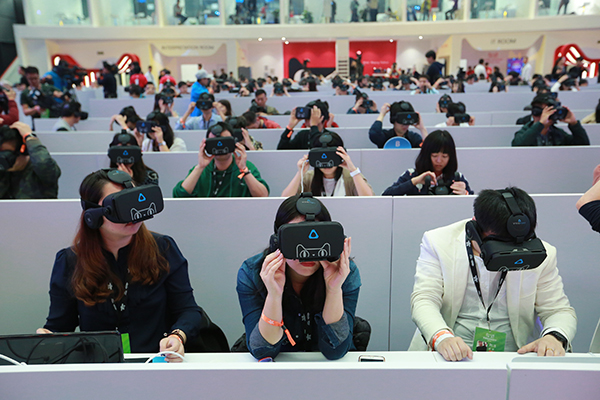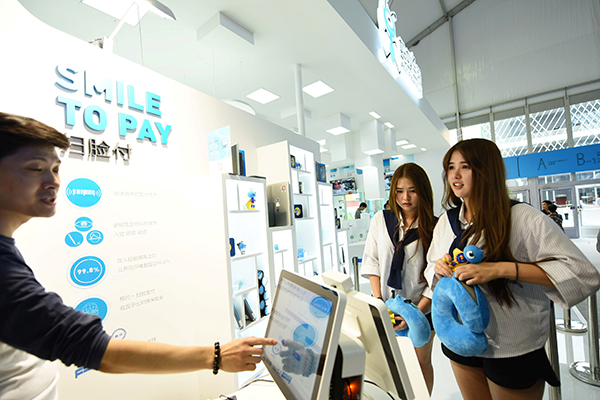Shopping in virtual reality
 |
|
People wearing VR headsets are invited to join a VR shopping experience on Nov 11 at Shenzhen Dayun Arena. The event was launched by Tmall, an online marketplace of Alibaba. [Photo?provided to China Daily] |
Have a look. Try it on. Buy it. All from the comfort of your home computer. That's the promise of VR shopping, but the technology has a way to go to become a major market force
Without traveling abroad during major sales seasons, Chinese netizens are able to get their hands on imported items on the cheap, thanks to the Nov 11 shopping festival, the biggest annual online sales event in China.
But rather than browsing and clicking online, they were given the opportunity to test a brand-new shopping experience enabled by virtual reality or VR technology, as e-commerce players geared up to stand out from the competition during the annual shopping extravaganza.
Tmall, an online marketplace of Chinese e-commerce giant Alibaba Group Holding Ltd, launched an online channel that enabled shoppers to try out the VR shopping experience between Nov 1 and Nov 11.
By wearing VR headsets, consumers were able to shop at Macy's, Target, Chemist Warehouse and other virtual stores on Tmall. Customers were able to check out items as if they were in real shopping malls and complete the entire shopping experience, from perusal to purchase, within the VR environment simply by controlling their gaze.
 |
|
Customers try Alibaba's new payment system, VR Pay, in Hangzhou, Zhejiang province. [Photo/Agencies] |
The tech-savvy shopping experience launched during this year's Nov 11 shopping festival is seen as Alibaba's move to test the waters in VR shopping, an emerging trend that the e-commerce giant is betting on to help drive up business growth in the future.
VR is still at a nascent stage in China. Much of the VR revenue comes from the gaming and entertainment industries. But Hangzhou-based Alibaba announced earlier this year to gear up the development of futuristic VR shopping experience named Buy+.
In March, it set up GnomeMagic Lab to push its VR strategy forward. The lab develops both VR and augmented reality or AR features to complement its existing online retail businesses.
To improve the VR shopping experience, Ant Financial Services Group, known as Alipay, an affiliate company of the Alibaba Group, is also working on VR payment technology, so that shoppers can enjoy a seamless VR shopping experience that is likely to allow them to complete payment procedure via iris recognition rather than in the "old school" way - taking off the VR headsets to input payment passwords in smartphones.
Alibaba is certainly not alone in terms of leveraging VR technology for online retail. Beijing-based JD.com Inc, China's second-largest online retailer, is also betting big on VR shopping. In September, JD.com launched its VR strategy that aims to provide an online shopping experience that can beat that offered by brick-and-mortar stores.
However, there are doubts over whether VR shopping can become part of the mainstream in online retail as plenty of obstacles remain.
Qin Kai, founder of BeanVR, a Shenzhen-based start-up dedicated to adopting VR technology in social networking, said VR shopping is a trend but it may take another three years for it to click with shoppers.
"For now VR shopping technology is not mature yet. Shoppers can sometimes feel dizzy when using the headsets to shop online. And it takes plenty of efforts and money to build 3-D content of every item sold online," he said, adding there was only a limited supply of goods that can be chosen via the VR channel during Alibaba's Nov 11 shopping carnival.























